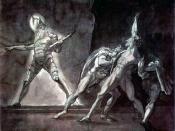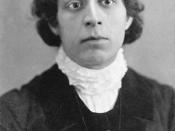During a soliloquy made in "Hamlet" by William Shakespeare, we see that Hamlet is a troubled man with feelings of insignificance, depression, and anger. The death of his father followed by the recent remarriage of his mother is just too much to handle for Hamlet, so as a catharsis of his emotions, Hamlet gives a powerful and emotional soliloquy describing his feelings. As Hamlet acts like a normal man to his stepfather, Claudius, soon after he leaves the room he purges his emotions of futility, grief, and rage. The first of Hamlet's emotions that he dwells on during the soliloquy is the feeling of worthlessness. Hamlet's opening line in his speech is "O, that this too too solid flesh would melt thaw and resolve itself into a dew!" He says this because he feels that his life is not worth living so he wishes to die.
Hamlet feels so overwhelmed by everything that is going on that he thinks of death as superior to living his current life. Hamlet's sadness is undertoned throughout the entire speech; for example, Hamlet talks more than once about the short length of time between the funeral and the marriage and even says "Ere yet the salt of most unrighteous tears had left the flushing in her galled eyes, she married." This means that before her eyes were dry from the tears of her dead husband, she remarried, basically inferring that it was a very short time between the two events. The last main emotion shown by Hamlet is his resentment. He is extremely angry at his mother for "post(ing) with such dexterity to incestuous sheets!" He says that his mother commits incest by marrying her brother-in-law. His use of words such as "wicked", "rank", and "unrighteous" give...


